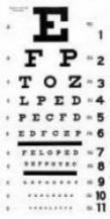Dilation of your eyes
Why is dilation advantageous to the patient?
Even with the most sophisticated instrumentation it is difficult to visualize the back of the eye through a small pupil. Imagine examining the contents of a closet through a keyhole. An individual would likely see only a small area in the rear of the closet. Dilating drops enlarge the pupil and allow full visualization of the back of the eye. Diseases such as glaucoma, diabetic retinopathy, macular degeneration, cataracts, vascular disease, tumors, and retinal detachment require pupil dilation for proper evaluation.
Who should have their pupils dilated?
For some patients, and those having a personal or family history of eye health problems, need dilated eye examinations. Individuals over 50 are more susceptible to primary eye diseases such as glaucoma and need dilated examinations. Dilation is also important for diabetics, people with high blood pressure, sickle cell disease, macular degeneration, and cataracts. People who are highly nearsighted are more prone to retinal detachment and require dilation to identify retinal breaks. Dilated eye examination is necessary for anyone who has recently had trauma to the head or eye and those experiencing flashes of light, floaters, or a curtain effect in their vision.
Who should not have their pupils dilated? Certain health and ocular considerations may contraindicate pupil dilation. Ocular anatomy, allergies, and certain medications may present a risk in pupil dilation. The doctor will carefully evaluate all risk factors prior to pupil dilation.
How long does dilation take?
Dilations drops are fast acting compounds and dilation of the pupil occurs in 20 to 45 minutes. Patients with light-colored eyes dilate faster than those with dark eyes.
How long does dilation last?
Depending on the drops used and an individual's sensitivity to the dilating drops, the effects may last 2 to 6 hours, or more depending on the eyes’ reaction.
What are the side effects of dilation?
Most people experience mild visual side effects while dilated. Typically individuals experience a blurring of near vision and increased sensitivity to light. Distance vision is usually less affected by dilation than near vision. Driving while dilated is generally not dangerous; however some people feel safer having a driver. Wearing sunglasses is very helpful in relieving the visual side effects of dilation.

TEL: 1-888-381-2677
FAX: 1-888-310-0029